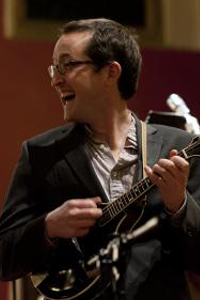Don't see what you're looking for?
Main Site
Berklee.eduCampuses and Schools

Joan Harrison
Joe Walsh
For media inquiries, please contact Media Relations
- Recordings with the Gibson Brothers (Ring the Bell and Help My Brother), two solo records (Saturday Night Waltz and Sweet Loam), and various recordings with Jonathan Edwards, Joy Kills Sorrow, Scott Nygaard, and others
- Performances with Emmylou Harris, Bela Fleck, John Scofield, Tracy Bohnam, Ricky Skaggs, Marty Stuart, and Alison Brown
- Performances at the Ryman Auditorium, the Kennedy Center, the International Bluegrass Festival in Buhl, Germany; and in Denmark, Ireland, France, and Italy
- Member of the bluegrass band the Gibson Brothers
- Member of the bluegrass band the Gibson Brothers, awarded 2012 Entertainer of the Year, 2012 Gospel Song of the Year, 2011 Album of the Year, and 2010 Song of the Year by the International Bluegrass Music Association
- B. M., Berklee College of Music
"I encourage my students to look for music that doesn’t need big words to communicate an emotion. Language is a very strong metaphor for music. Too frequently it can be about putting big words into sentences, whether or not they actually belong there. The best way to communicate is usually a well-constructed simple sentence."
Get More Information
By requesting information from Berklee, you will receive emails about our educational programs, student resources, facilities, and more based on your selections.
Thank you for requesting information.
Check your inbox for an email from Berklee. You will start to receive program information, updates, and deadline reminders.
Find the program that's right for you with Berklee's Find Your Program tool.
